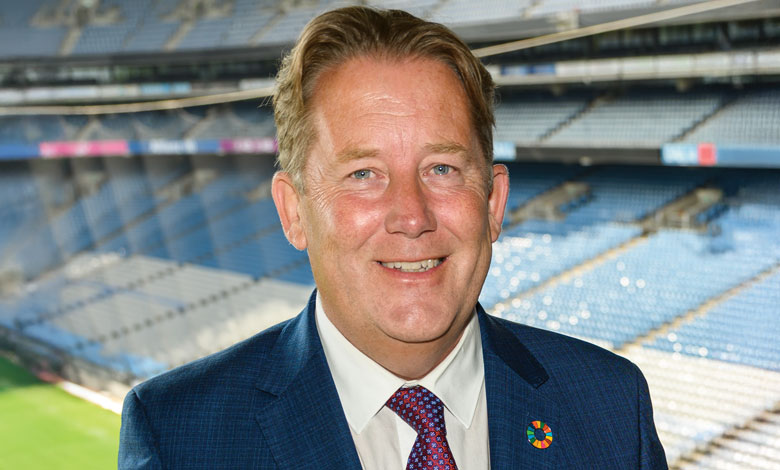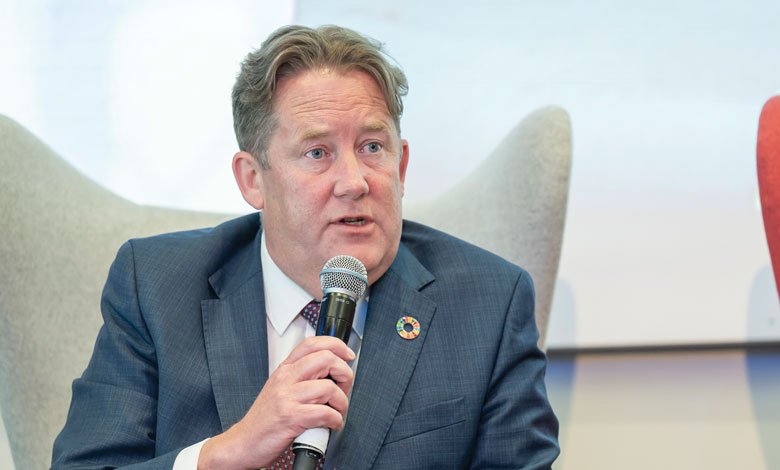
Powering Ireland’s energy revolution BnM’s Brendan Kelly
15th October 2025
Energy demand and data centres
5th January 2026On the cusp of an energy revolution

Minister for Climate, Energy and the Environment Darragh O’Brien TD discusses the acceleration of Ireland’s energy transition, emphasising the need for enhanced grid investment, delivery of offshore wind projects, and all-island collaboration to achieve renewable energy targets.
Minister O’Brien, appointed in January 2025, highlights the scale of Ireland’s energy ambitions and the centrality of energy policy to government priorities.
“The three key priorities for this government are energy, housing, and water,” he explains, stressing that delivery, rather than policy formation alone, is the ultimate measure of success.
As part of the ongoing revised National Development Plan, the Government is rolling out its largest-ever infrastructure investment programme, encompassing €102.4 billion in departmental capital expenditure for 2026-2030, supplemented by €10 billion in equity funding to fast-track high-impact projects in energy, water, and transport.
In energy specifically, a €3.5 billion is to be allocated to EirGrid and ESB Networks – €2 billion and €1.5 billion respectively – aiming to modernise the electricity grid, enable onshore and offshore transmission growth, and reinforcing system resilience. This investment is foundational to accelerating grid development, strengthening interconnection capacity, and scaling up large-scale renewable energy deployment.
Legislative foundations for energy transition
The Minister outlines significant progress in establishing a legislative framework to enable faster energy project delivery.
“The Planning and Development Act 2024 will commence this year and will shape the planning environment from the start of next year,” O’Brien states.
Alongside this, the Marine Planning and Development Management Act and the creation of MARA (Maritime Area Regulatory Authority) as a single consenting body represent significant steps towards streamlining the development of offshore renewable energy.
These reforms, he says, are designed to ensure “an environment that supports accelerated delivery” of energy projects across the State.
“We have done well regarding onshore, and now we need to deliver offshore. That means starting construction, getting tangible progress that people can see.”
Minister Darragh O’Brien TD
Ireland’s renewable journey
Reflecting on Ireland’s progress, O’Brien outlined that in 2005, only 7 per cent of electricity came from renewable sources. By 2024, this had risen to 40 per cent, largely due to the success of onshore wind development. Solar energy has also grown significantly: from just 0.06 per cent in 2018 to up to 14 per cent on peak days, averaging 3 per cent to 4 per cent.
“This is real progress,” he says. “But our targets are even more ambitious: 80 per cent of electricity from renewables by 2030. That will be a challenge, but it is one we will meet.”
The Minister confirmed that a further renewables auction will take place this year, attracting “substantial interest” from wind and solar developers.
Offshore wind
While Ireland has delivered significant gains onshore, O’Brien describes offshore wind as the country’s “untapped resource” and a critical enabler of long-term energy security and decarbonisation.
“There are a number of projects progressing through planning, but we need to get construction started and turbines in the water before the end of this decade,” he says. “That is the priority.”
Recent requests for further information from An Coimisiún Pleanála on some ORESS 1 projects have caused delays, but O’Brien stresses that the Government is committed to overcoming barriers to ensure offshore wind moves from ambition to reality.
Building a resilient energy grid
Central to unlocking renewable potential is a modern, expanded, and resilient grid. O’Brien identifies grid investment as his “particular focus”, highlighting the upcoming Price Review Six (PR6) regulatory period as pivotal.
“PR6 will see multiples of the investment we had in PR5,” he says, adding that this will include major upgrades for EirGrid and ESB Networks to ensure that both onshore and offshore renewable energy can be integrated efficiently.
A strong grid is also essential for security of supply, which O’Brien described as a key driver behind government investment. “Nothing in this country happens without a sustainable and expanded energy supply. It is critical for our economy, housing growth, and population growth.”
Interconnection and all-island collaboration
Ireland’s interconnection ambitions are focused on completing with the Greenlink Interconnector between Ireland and Great Britain, and the Celtic Interconnector, the first direct electricity link to continental Europe, both under development.
“These projects will allow us to import and, crucially, export energy in the future,” O’Brien explains.
The Minister also underscores the strategic importance of the North-South Interconnector, fully consented in both jurisdictions but yet to begin construction. “This is a project that has been talked about for a long time, and we need to proceed. It is critical to reducing energy costs and improving grid resilience on the island.”
O’Brien expresses a desire to accelerate delivery, aiming to bring the project completion date forward from 2031 to “the end of this decade, if at all possible”.
Security
Beyond climate considerations, the Minister framed energy policy as fundamental to Ireland’s economic and social development. He points to Ireland’s population growth – 50 per cent since 1990 – and a sixfold increase in GDP over the same period.
“Our job is to expand capacity, not restrict ambition,” O’Brien says, addressing concerns over competing demands on the energy system. He emphasises that Ireland’s energy transition will support, rather than constrain, economic growth, housing delivery, and industrial development.
The Government is also working to phase out fossil fuels, with coal set to exit the energy mix by the end of this month. “We are reducing our dependence on fossil fuels while building the infrastructure to ensure energy security for decades to come,” he says.
Implementation
O’Brien acknowledges the challenges of meeting 2030 climate targets and confirms that Ireland will engage closely with EU partners on compliance and flexibility measures.
However, his broad message is one of optimism and urgency. “We are on the cusp of an energy revolution,” he says. “We have done well regarding onshore, and now we need to deliver offshore. That means starting construction, getting tangible progress that people can see.”
The Minister stressed that implementation will require close collaboration with industry. “I have said to the energy sector that I want you in the room. We have done some things very well, others less so, but we are committed to working together.”
O’Brien concludes by reaffirming the Government’s commitment to work with all stakeholders to deliver on Ireland’s energy transition.
“Our sole focus is to realise the potential of renewable energy for the good of our country, for climate action, and for economic and social growth,” he says. “Nothing can be done without sustainable energy. Over the next five years, I will work every day to achieve this.”

